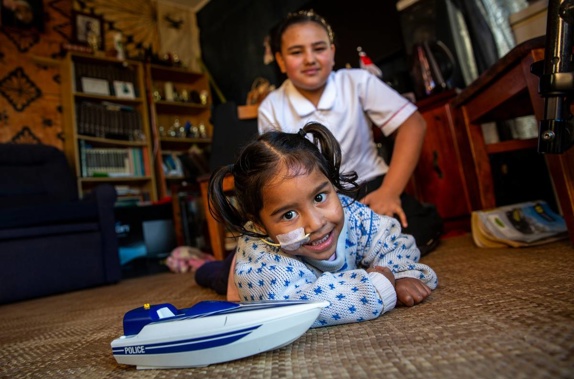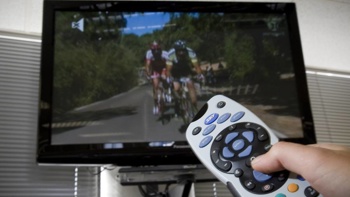
A toddler's cardiac arrest which left her with a brain injury could have been avoided if not for several treatment failures at Auckland hospital, an ACC investigation has found.
There have been a handful of investigations into Jeanette Queensell-Logan's case which was referred to the Director-General of Health - a move only done when they believe there could be a risk of harm to the public.
The Auckland pre-schooler, who turns four next month, is now confined to a wheelchair and is having to learn how to do things she had started doing before the incident like walk, talk and swallow.
The just 3 months old, Jeanette was diagnosed with D-Transposition of the arteries, a birth defect in which the large arteries of the heart are not connected properly.
She has several holes in her heart and, at 16 months, had a pacemaker inserted.
/arc-anglerfish-syd-prod-nzme.s3.amazonaws.com/public/3I7YIC2UDJEGHOIHSKYZTE7RQU.jpg)
Jeanette with her parents Stephen and Mele Logan and her five siblings. (Photo / Michael Craig)
A month before she turned 2, she was rushed to Auckland Hospital after a runny nose, cough and breathing problems failed to clear.
ACC investigator Neil Waldman wrote in a report that she initially received good care.
Heart failure was initially suspected as the cause but an X-ray did not reflect that. But two doctors failed to appreciate the signs and did not consider another diagnosis, Waldman wrote.
"The failure to recognize that she had ongoing severe respiratory distress and shock was a mistake. This should have changed the course of treatment."
He said it was unclear why different teams of doctors did not help to stabalise Jeannette while she was in respiratory distress.
An arterial blood gas test should have been done and would have shown sooner that she was suffering from incidental hyperkalemia - high levels of potassium in the body.
"The involvement of so many doctors and teams seems to have delayed critical care that was necessary to stabilize Jeanette," Waldman said.
"There doesn't appear to have been any team leader at this point. No IV access and no blood samples were obtained for over an hour which was too long for a critically ill child in shock."
The doctors did not cause the hyperkalemia but doctors had "ample opportunity" to detect it through lab tests that should have been done sooner, he concluded.
The hyperkalemia was detected and results released by the laboratory to the intensive care team 40 minutes before Jeanette went into cardiac arrest.
"If they had recognized the hyperkalemia sooner it would have mandated treatment with IV calcium and there is a reasonable chance her arrest could have been avoided," Waldman said.
/arc-anglerfish-syd-prod-nzme.s3.amazonaws.com/public/F6WIEJLPKJACFH3KG7ZJH55WUU.jpg)
Jeanette Queensell-Logan suffered a cardiac arrest, aged 23 months. (Photo / Mike Scott)
Jeanette's cardiac arrest and brain injury and has left her needing round-the-clock care. Major modifications are needed for the three-bedroom Glen Eden home she shares with her father, mother Mele and five siblings.
"Jeanette is a baby again," says her father Stephen Logan.
"She is crawling like a caterpillar rolling over and over on the floor. She grunts and nods."
A review of ACC's decision not to provide cover for the family concluded there was a "failure in the provision of treatment up until the cardiac arrest".
In its own review, seen by the Herald on Sunday, senior ADHB medical clinicians noted her resuscitation and stabilisation were challenging due to difficulties obtaining intravenous access. This caused a delay in Jeanette being treated for hyperkalemia and hypoglycaemia.
They disputed Jeanette's cardiac arrest was avoidable and systemic improvements did not need to be made, but said noted "some areas to look into to see if there were opportunities for improvements (an example is the laboratory notification system) and these are being progressed as part of our on-going clinical excellence programme efforts".
They added that they did not feel the quality of the external evidence relied on by the ACC in arriving at it's decision to provide Jeanette's family cover, was adequate.
Dr Margaret Wilsher, chief medical officer, at the ADHB, told the Herald on Sunday there was nothing that could be done to prevent Jeanette's outcome.
/arc-anglerfish-syd-prod-nzme.s3.amazonaws.com/public/EQG3D3I7PJBZ3MIKKKKBLN3Z34.jpg)
Jeanette Queensell-Logan with her mother Mele Logan and father Stephen Queensell. (Photo / Mike Scott)
"She was actively and appropriately treated in children's ED by a highly experienced team, personally directed by a senior paediatric emergency medicine Specialist."
The ADHB released its review to the Logan family in December and met with them in January at the request of Jeanette's father who wanted answers.
"Put it this way, we both agreed to disagree" he said.
"I think her condition was not assessed correctly soon enough. There were so many warning signs there that they didn't pick up and they failed to respond to. Meanwhile she was going downhill and no one is taking any overall responsibility."
An ACC spokesman said it filed a risk of harm report to the Director-General of Health because there was a "a failure to provide treatment, or to provide treatment in a timely manner".
Dr Andrew Simpson, chief medical officer, Ministry of Health said when it received harm reports it asked the relevant provider to investigate and notify of any required changes to minimise future risk.
But the ADHB said its review was completed and it was not necessary to carry out another investigation.
Logan has also complained to the Health and Disability Commission and the Prime Minister, who referred him to the Minister of Health.
Jeanette's heart problems will always slow her down but doctors expect she will eventually regain some mobility. She's learning to talk and swallow again before she can begin eating.
Take your Radio, Podcasts and Music with you









